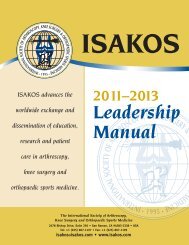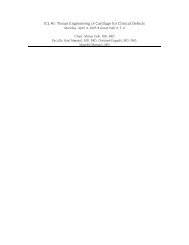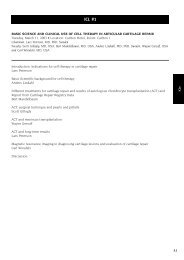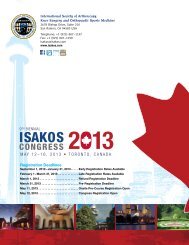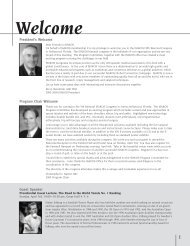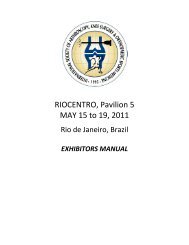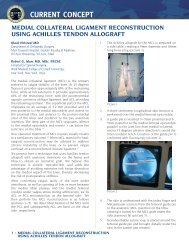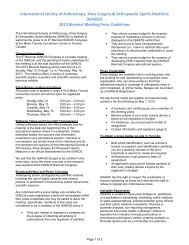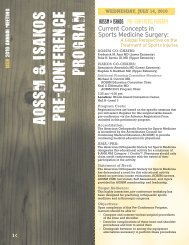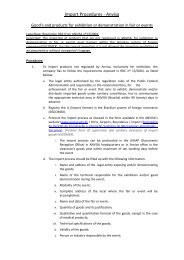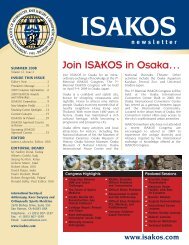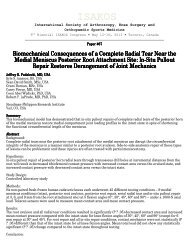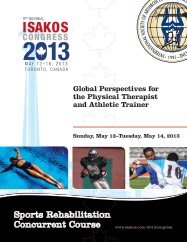POSTER ABSTRACTS - ISAKOS
POSTER ABSTRACTS - ISAKOS
POSTER ABSTRACTS - ISAKOS
Create successful ePaper yourself
Turn your PDF publications into a flip-book with our unique Google optimized e-Paper software.
injury testing within one week of injury (mean=2.0<br />
days). Abnormal test performance was determined<br />
by the application of reliable change index scores<br />
(RCI’s). 65% of concussed athletes reported a<br />
significant increase in symptoms compared to<br />
baseline. 35% of the subjects did not report<br />
increased symptoms. However, 82% of the<br />
concussed sample did demonstrate significantly<br />
poorer neuropsychological test results, as<br />
measured by the Verbal Memory, Visual Memory,<br />
Reaction Time or Processing Speed indices from<br />
ImPACT. Therefore, the addition of<br />
neuropsychological testing resulted in a net<br />
increase in sensitivity of 17%. The combined<br />
sensitivity of symptoms reporting and<br />
neuropsychological testing was 88%. Reliance on<br />
player self-reported post-concussive symptoms is<br />
likely to result in poor diagnostic sensitivity and is<br />
also likely to result in the premature return to play<br />
by concussed athletes. The addition of a<br />
computer-based neuropsychological protocol<br />
increases diagnostic sensitivity significantly. The<br />
careful evaluation of both player symptoms and<br />
neuropsychological test results represents the<br />
most useful approach to concussion<br />
management.<br />
using the ImPACT computer -based test battery.<br />
We compared two groups: first concussion (N=<br />
155) and athletes who sustained ?? concussion<br />
(N=46) based on Verbal-, Visual memory,<br />
Processing speed, Reaction time and Symptoms<br />
composite score.<br />
Results: Comparing the No concussion History<br />
group to the History of concussion group did<br />
show increase in on field -symptoms for the<br />
history group. But there is neither significant<br />
difference in their neurocognitive performance nor<br />
for their symptoms looking at 2 days and 7 days<br />
post injury.<br />
Discussion: Athletes who had experienced a<br />
concussion in the past did not perform worse on<br />
neuropsychological testing than athletes with no<br />
History of concussion. Neither did the group differ<br />
on their on- field symptoms. These results suggest<br />
that if an athlete has symptom free period<br />
between his concussions he is likely to recover<br />
without any residual problems.<br />
E-poster w/ Standard #1112<br />
Effect of Multiple Concussions<br />
Derk Anton van Kampen, Deventer,<br />
NETHERLANDS, Presenter<br />
Mark R Lovell, Pittsburgh, PA USA<br />
Michael W. Collins, Pittsburgh, PA USA<br />
Freddie H. Fu, Pittsburgh, PA USA<br />
University of Pittsburgh Medical Center,<br />
Pittsburgh, PA, USA<br />
Introduction: The management of concussion has<br />
become a public health issue since approximately<br />
300,000 concussions occur a year in the USA a<br />
lone. Most discussion is focused on return to play<br />
decision-making, based on the athletes symptoms<br />
and neurocognitive performance. Currently there<br />
is no consensus on the risk of having multiple<br />
concussions although general previous studies<br />
have shown an indication for decline of<br />
performance. The current study was designed to<br />
evaluate the importance of a history of<br />
concussions on a new concussion based on<br />
neuropsychological test performance, conducted<br />
at 2 days and 7 days post injury.<br />
Method: A group of 201 High school and college<br />
athletes were tested pre-season, 2 days and 7 days<br />
post concussion. All the athletes were evaluated




